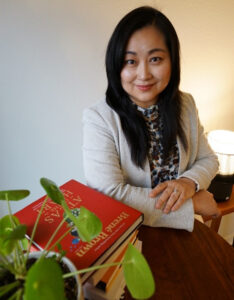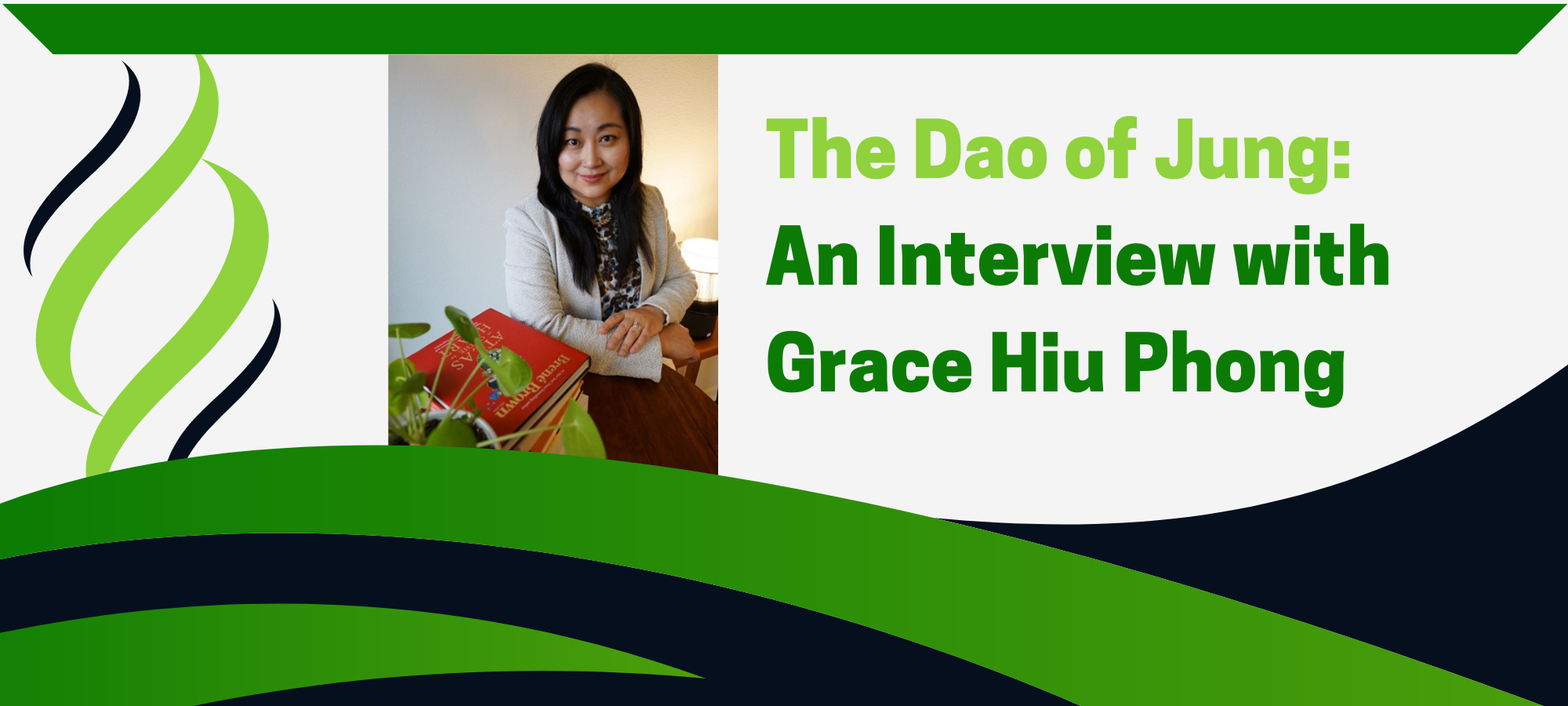Grace Hiu Phong is a licensed massage therapist, a first-generation immigrant, and a first-year student in Pacifica’s Ph.D. in Depth Psychology with Specialization in Integrative Therapy and Healing Practices. I’m delighted to speak with her about her work.
***Please note, one of the things we’ll be discussing is Grace’s internship at REST (Real Escape from the Sex Trade). Although the content of our conversation is not graphic, it is, nonetheless a topic that may be traumatic for some. It is also timely, as January is Human Trafficking Prevention Month. Please feel free to skip reading this article if the topic is likely to be a trigger for you. Our intent is to show how professionals in psychology can assist in treating this global pandemic.***
Angela: Thank you so much for speaking with me, Grace. I would love to hear a little background about your life. You mentioned that you’d been back to Hong Kong recently. Is that place significant in your history?
 Grace: I was born and raised in Hong Kong until I was 23, and then I received my green card through a lottery. So I moved to Seattle by myself with no family or friends, and when I arrived, I went to massage school. I had a license in Washington as a massage therapist and owned my own clinic for many years. I’m passionate about the body and health. After 15 years, I got my Masters in psychology and now I have my own private practice in mental health counseling. I’m trilingual, so most of my clients are people of color who work in the tech industry.
Grace: I was born and raised in Hong Kong until I was 23, and then I received my green card through a lottery. So I moved to Seattle by myself with no family or friends, and when I arrived, I went to massage school. I had a license in Washington as a massage therapist and owned my own clinic for many years. I’m passionate about the body and health. After 15 years, I got my Masters in psychology and now I have my own private practice in mental health counseling. I’m trilingual, so most of my clients are people of color who work in the tech industry.
Angela: I was fortunate to live in China and study the culture for some time, and my understanding of Chinese culture is that it can have a certain taboo around mental health issues. Have you found that to be true?
Grace: Yes, you are right. I think social media has helped to normalize mental healthcare. For the older generation, it’s taboo to disclose what is happening in your family. But the younger generation is willing to do that. I’m in my forties, so I understand both worlds. But the younger kids are definitely more open about mental health and seeing how their family origin has been impacting them.
I’m now getting my psychology degree at Pacifica, and I’ve been thinking a lot about how the Chinese government deals with mental health. Jung talked about the unconscious, and in China we don’t talk openly about such things because it’s easier to manage when people don’t go too deeply. So not only is it taboo in our family culture, where depression can sometimes be seen as “crazy,” talking about the family of origin can also being seen as a disrespectful behavior toward the parents. Also, the individuation process in Jung’s psychology can also cause tension within the collectiveness of Chinese culture.
Angela: How did you come to work in trafficking prevention, and what was the experience like?
Grace: When I moved to the States, being a massage therapist, I experienced a lot of sexual harassment as an Asian woman giving a massage, even though I had my own clinic set up as a treatment center. I also met a lot of women who moved to the states or used a travel visa to practice massage, but because they were unlicensed and didn’t speak English, they were controlled by other people. They weren’t free to choose their own customers. It stuck in my mind. During the last year of my Master’s degree, I wanted an internship related to that experience. So I found REST – Real Escape from the Sex Trade [https://iwantrest.com/], interviewed with them, and shared my story.
Immediately, the shelter manager said I’d be perfect because they have a lot of people who are forced to perform massages, and they are victims of human trafficking; their passports are kept by the spa owner until they pay back their “Hiring fee.” That’s when I understood why they couldn’t choose their own clients and were forced to perform sexual acts. I also understood why they dressed as they did. At first, I was hoping my ability to speak Mandarin would support those people. But when I got into the internship, most of the victims were black and white Americans who had escaped to Washington and were sharing their stories. I realized how easy it is for a girl or woman to be taken into human trafficking. It can happen in your own backyard. It’s unexpectedly easy to become a victim.
Angela: January is trafficking prevention month. Do you have any advice for psychologists who want to help this population in a therapeutic setting?
Grace: A lot of victims don’t want to talk to you if you’re coming from a place of “I’m helping you” or a savior role. Some of them believe that they choose to do this job and don’t see that they are being controlled. They don’t need you to “save” them. They want people to see them as people who struggle just like everyone else. As a therapist, I had a hard time working with them at first. After some reflection, I changed my role from being a therapist to a holistic coach. I’d do card reading, self-massage with aroma oil, and perform cleansing rituals with them… I even smoked cigarettes with them on their breaks to make them see I was just another human being and not above them. So, go into this work with a humble heart, not just to serve but to learn.
Angela: The internship must’ve made it difficult to remain upbeat. How did you manage the stressors of that kind of work?
Grace: In the first month of my internship working with trafficking survivors, I got second-hand trauma. There were times I was feeling a lot of rage and helpless energy. So, I believe self-care is super important. When you leave work for the day, you need to really leave work behind. I also found that having a ritual after work is important. Because this was a Christian organization, we prayed for all the victims we’d met that day. I need to open my imaginative “psyche-door” to let them exit from my head. For me, bringing spirituality into the work is a form of self-care.
Angela: How did you make your way to Pacifica and what are you studying?
Grace: I talked to my therapist about looking for a Ph.D. program that is focused on the “Wholistic” aspects of a person. So when I looked at Pacifica’s website, it immediately gave me a sense of the holistic essence and whole-person approach, which was really attractive to me. Because I have an art and massage background, holistic healing is really appealing to me. It fit my needs. I have some ideas about my research. I’d like to bring the Dao into Jungian literature, maybe a comparison or integration. As a Christian, I feel like Dao is God; Dao is a space for the psyche. I still have some much I want to learn in Pacifica.
Angela: I haven’t heard of that as a topic before. What would that look like?
Grace: So far, I’m thinking of using the Dao idea of “wu-wei” from Lao-tzu to see how that idea can integrate the process of individuation for people who want to find peace in uncertainty or see Dao in James Hillman’s idea of the Soul-making process.
Angela: Is there an awareness in mainland Chinese culture of Jung? What is the popular opinion on his work if anything?
Grace: On the surface, there is an “official” Jungian society that offers classes, but I heard that they have their own way of interpreting Jung. I am not sure how the different approaches of Jung would be welcomed. At this moment, I am not confident that I can freely express my way of psychology. This is a sensitive area to go into.
Angela: Do you practice in Hong Kong?
Grace: Yes, both in Washington and Telehealth with clients in Hong Kong. I just went to Hong Kong to teach some workshops about mental health for low-income households and classes on the “Internal Family System.” I integrated some of the Jung material into that and was well accepted.
Angela: What do you most love about Pacifica?
Grace: The way of expression is what I love most about Pacifica. People are so willing to go deep and also to be very creative in expressing themselves. Especially because English is my second language, I need imagination to facilitate my understanding of the materials. Teachers and everyone at Pacifica are so good at making that space for me. For example, at the beginning of class, we often have a moment of silence/meditation and a moment to look at artwork and connect with nature. We’re encouraged to share open-mindedly. Those gestures bring our head to our heart and go in-depth into our soul communication. When people in Pacifica are so willing to come to that level of communication, it is very helpful to me as a foreigner. It’s very unusual for a Chinese person. We usually focus on writing notes and taking the literal approach, word by word. But this sometimes misses the imaginative part of what’s being said.
Angela: Thank you so much for sharing some of your personal history and journey into counseling. I wish you the best of luck in your studies and look forward to Dao and Jung together.

Originally from Hong Kong, Grace Phong has a bachelor’s degree in fine arts, majoring in acting. After being a theater actress for eight years in Hong Kong, she moved to the US and got her Massage therapist license in Washington. She has been a certified spiritual director since 2012, and organized and hosted holistic retreats for eight years. She is now a mental health therapist practicing in both Hong Kong and Washington. She is currently pursuing a Ph.D. in in-depth psychology at Pacific Graduate Institute. You can find her at soul-blossom.net

Angela Borda is a writer for Pacifica Graduate Institute, as well as the editor of the Santa Barbara Literary Journal. Her work has been published in Food & Home, Peregrine, Hurricanes & Swan Songs, Delirium Corridor, Still Arts Quarterly, Danse Macabre, and is forthcoming in The Tertiary Lodger and Running Wild Anthology of Stories, Vol. 5.


